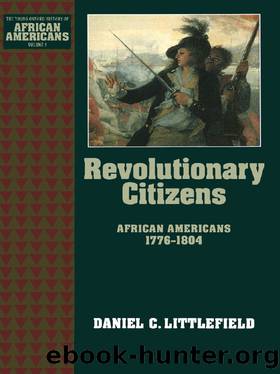Revolutionary Citizens by Littlefield Daniel C.;Lewis Earl;Kelley Robin D. G.;

Author:Littlefield, Daniel C.;Lewis, Earl;Kelley, Robin D. G.;
Language: eng
Format: epub
Publisher: Oxford University Press, Incorporated
Published: 2014-08-15T00:00:00+00:00
The first African-American lodge of Freemasons was formed by Prince Hall in Boston in 1775.
Having found kindred spirits in Boston, the Free African Union Society finally communicated with Granville Sharp in London, who was becoming involved with the settlement of Sierra Leone. But Sharp was not enthusiastic about American blacks coming over, especially if they insisted on acting independently. He made clear that if they came to Sierra Leone, they would have to act like English subjects and be bound by the common laws of England. The vision came to nought. Massachusetts was unwilling to put up any money to aid black emigration and Thornton, for all his planning, did not come through either. The blacks lacked the financial wherewithal to do it on their own.
Still, New England blacks would not give up. In 1789 the Free African Union Society addressed an appeal to compatriots in nearby Providence, Rhode Island, proposing a new plan of emigration. In this document they advanced an early black nationalistic concept of uniting blacks in Africa, the West Indies, and the United States. Because they were âattended with many disadvantages and evils with respect to livingâ in the new American nation, they sought a nationhood of their own. They suggested a return to âthe natives in Africa from whom we sprang, [they] being in heathenish darkness and sunk down in barbarityââto whom African Americans would bring light. The success of the project would benefit Africans everywhere, for Africaâs lack of civilization, as they saw it from a western point of view, was a source of shame. That lack was used to justify enslavement and the slave trade. If Africa were redeemed, the slave trade would cease, Africans overseas would be able to take pride in their homeland, the black manâs humanity would be vindicated, and the link between blackness and slavery would be dissolved.
The Boston group invited the Providence blacks to join them in a united society that would meet every three months âto consider what can be done for our good, and for the good of all Affricans.â âNow is the time,â the Providence group would say in advancing yet another emigration plan in 1794, âif ever for us to try to Distinguish ourselves as the More remote we are situated from the white people the more we will be respected.â
It is interesting to compare the plans developed by blacks (called âemigrationistâ) and those envisioned by whites (referred to as âcolonizationistâ). People like Jefferson who wanted blacks to depart were primarily concerned about the future and well-being of white people. Jefferson was not much interested in what happened to blacks, and his emancipation plans for Virginia would have compelled them to leave whether they wanted to or not.
People like Thornton, by contrast, had a religious and moral concern. They were interested in illustrating that blacks could progress in economic terms, both in America and Africa, because such advances would justify their struggles for black emancipation, validate their faith in the essential unity of humankind, and contribute to an end to black servitude worldwide.
Download
This site does not store any files on its server. We only index and link to content provided by other sites. Please contact the content providers to delete copyright contents if any and email us, we'll remove relevant links or contents immediately.
The Goal (Off-Campus #4) by Elle Kennedy(13207)
Kathy Andrews Collection by Kathy Andrews(11331)
Diary of a Player by Brad Paisley(7270)
What Does This Button Do? by Bruce Dickinson(5936)
Assassin’s Fate by Robin Hobb(5858)
Big Little Lies by Liane Moriarty(5519)
Altered Sensations by David Pantalony(4872)
Pale Blue Dot by Carl Sagan(4626)
Sticky Fingers by Joe Hagan(3916)
The Death of the Heart by Elizabeth Bowen(3342)
The Heroin Diaries by Nikki Sixx(3324)
Beneath These Shadows by Meghan March(3153)
Confessions of a Video Vixen by Karrine Steffans(3104)
The Help by Kathryn Stockett(3021)
How Music Works by David Byrne(2968)
Jam by Jam (epub)(2880)
Harry Potter 4 - Harry Potter and The Goblet of Fire by J.K.Rowling(2813)
Strange Fascination: David Bowie: The Definitive Story by David Buckley(2702)
Petty: The Biography by Warren Zanes(2575)
